L.A. Kelley's Blog, page 12
June 29, 2017
Book Review: How Music Works by David Byrne
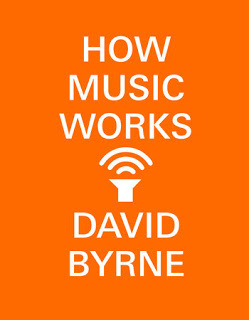 David Byrne is the front man of The Talking Heads, but son of a gun, he’s also a heck of a writer. How Music Works isn’t a typical celebrity biography. Byrne examines his own career in the broader context of the history of music; where it came from, how it’s created, and the evolution over time responding to the changes in society. His insights are fascinating.
David Byrne is the front man of The Talking Heads, but son of a gun, he’s also a heck of a writer. How Music Works isn’t a typical celebrity biography. Byrne examines his own career in the broader context of the history of music; where it came from, how it’s created, and the evolution over time responding to the changes in society. His insights are fascinating.Byrne notes music isn’t produced in a vacuum. Instead, musicians create works to fit the available venue. The first music was African drumbeats made to be performed in the open. As people moved indoors and venues changed so did the music and the audience interaction. He takes readers through advancements in music, noting the differences and continued evolution. Concerts have a completely different sound in a small theater than an outside arena and music had to adapt. With smaller groups, the interaction is up close and personal, the audience can distinguish individuals and their talents, but with growth comes complexity. You can’t pick the contribution of one clarinet from a whole orchestra.
Much of the book is dedicated to technological innovations starting with early wax cylinders up to present day music created not with instruments, but computers. Devices make it easier to acquire music, but music, once meant to be shared, is now often a solitary activity. The use of electronics to format a perfect performance created a strange juxtaposition. A recording was originally the simulation of a live performance. Now performances are considered the simulation of a recording.
This isn’t a book for someone only interested in the entertainment aspect of the music business, although Byrne goes into a lot of detail about his own career with The Talking Heads. Rather, it’s a detailed and thoughtful study for readers with a serious interest in all aspects of music; from history, business and finances, to deeper questions of where music comes from and why does it matter so much to us.
I received this book from Blogging for Books in exchange for a review.
Published on June 29, 2017 04:00
June 27, 2017
The Summer Solstice: Greetings Earth Mothers and Fathers. There's still time to light your fire wheel.
 Blogging today at Paranormal Romantics. Here's the post.
Blogging today at Paranormal Romantics. Here's the post.Greetings Earth Mothers and Fathers. There's still time to light your fire wheel.
The movement of the sun during the course of the year held particular fascination for the ancients. Rites of renewal often involved the different solstices. Named from the Latin words for sol (sun) and sistere (to cease), the solstices occurred during times when the sun appeared to magically stop one progression and begin another. The summer solstice in the northern hemisphere is on June 20. On that day the sun reaches the highest point in the sky, signaling the start of the hottest days of year, followed by more rapid crop growth, and an eventual harvest to fend off starvation. Not without proper mystical intervention, of course.
 Pagan beliefs
Pagan beliefs
The summer solstice held the most importance to pagan or nature worshipping religions, and they spanned the globe. Greeks, Romans, Chinese, Vikings, Native Americans, and Druids among many others had celebrations linked to the longest day of the year. They often encompassed wild abandonment and fertility rituals (rather like spring break today). Ancient Greeks marked the solstice with a festival of Cronus consisting of feasts, games, and the strange tradition of having slaves served by their owners for a day. In ancient Rome, the festival marked the only time married women could enter the temples of the vestal virgins to make offerings to Vesta, the goddess of hearth and home. In Chinese mythology, the summer solstice was a time to celebrate yin (femininity) and earth. As the Catholic Church attempted to lure pagans to its beliefs, it adopted June 24 as the festival of the nativity of St. John the Baptist, appealing to ancient beliefs and encompassing the theme of birth.
Summer solstice festivals in Great Britain's pagan times often involved fire. Flames, smoke, and ashes were believed to have purification powers to drive away evil spirits and protect homes, families, livestock, and crops. Hence the continued use of burning palms on Ash Wednesday. Rituals also involved singeing horses or cattle with embers or driving them through the smoke to invoke magical protection. One of the more bizarre practices is still done for tourists. Locals roll a giant flaming wheel down a hillside and (hopefully) into a lake and not the neighbor’s barn. The wheel is stuffed with straw or hay. Pagans believed if it rolled all the way to the bottom and into the water the harvest would be good. If it didn’t make it or skewed off the path, the harvest would be bad, and probably make the neighbor with the burning barn come after you with a pitchfork.
Changes in Sunlight and Psychology
 Psychological reasons may also explain why the summer solstice holds such importance. A lack of sunlight has long been associated with increased depression. Scientific American reported on a study of tweets done in 2011. Researchers looked at random tweets and analyzed them for emotional content as a function of the time of day, the day of the week, and the amount of actual daylight (i.e., the season). They found the amount of daylight was not as important as the relative change in that daylight. Meaning that when the change was positive (days grow longer), people expressed more positive views. When the change was negative (days grow shorter), attitudes soured.
Psychological reasons may also explain why the summer solstice holds such importance. A lack of sunlight has long been associated with increased depression. Scientific American reported on a study of tweets done in 2011. Researchers looked at random tweets and analyzed them for emotional content as a function of the time of day, the day of the week, and the amount of actual daylight (i.e., the season). They found the amount of daylight was not as important as the relative change in that daylight. Meaning that when the change was positive (days grow longer), people expressed more positive views. When the change was negative (days grow shorter), attitudes soured.Myths Associated with the Summer Solstice
The seasons change because of the Earth's distance from the sunThe Earth rotates around the sun in a fairly regular orbit and the closest point is during the winter. Seasons change because of the Earth’s tilt on its axis. In the summer, the Earth tilts toward the sun bringing more warmth to the surface, while in the winter, it's tilts away.
Summer solstice is the overall hottest day of the yearThe solstice brings the most light, but not the most heat.
On the summer solstice an egg will balance upright on a table.
 Actually, you can do this anytime. Shake a raw egg until the yolk breaks inside the shell. Place the egg back in the carton. Once the yolk settles to the bottom of the shell it will stand upright because more weight is at the bottom. Now, invite family and friends into the room, recite mystical mumbo jumbo about the summer solstice, and place the egg upright on the table. Try not to laugh at their stupefied expressions.
Actually, you can do this anytime. Shake a raw egg until the yolk breaks inside the shell. Place the egg back in the carton. Once the yolk settles to the bottom of the shell it will stand upright because more weight is at the bottom. Now, invite family and friends into the room, recite mystical mumbo jumbo about the summer solstice, and place the egg upright on the table. Try not to laugh at their stupefied expressions.
Published on June 27, 2017 02:00
June 26, 2017
Book Spotlight: Angels Fly by Donna Simonetta
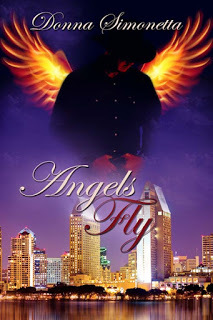 Angels Flyby Donna Simonetta
Angels Flyby Donna Simonetta
Angels Fly is on sale for 99 cents from June 23-July 7
Two years after her husband’s death, Kelly believes her romantic life is done. Until she reconnects with her girlhood crush on social media, and as fate would have it, he lives across the street.
James is over the whole true-love thing. His grasping ex-wife tore that belief out of him, when she left him for a rich, old man. Then he finds out his first love moved to San Diego too, and their attraction burns as hot as ever.
What they don’t know is that Fate didn’t bring them together – the Guardian Angel Corps did, led by two unlikely Cupids – Kelly’s late husband and Zane, a rough and tumble, 19th century cowboy. When a Fallen Angel decides to tear Kelly and James apart, cherubs and harps aren’t going to cut it, and Zane’s unique skills might be just what they need to get a second chance at their first love.
ExcerptJames held Kelly’s hand as he walked her to her apartment building from his car. While they were still in shadows, before they reached the bright light of the entrance, James stopped and turned to face Kelly. He cupped her face in one of his big, rough hands and rested the other lightly on her waist. He traced her cheekbone with a feather light touch of his thumb, and Kelly couldn’t help but turn her face into his hand like a kitten. She did manage to stop herself before she purred, and was pretty darned proud of that achievement.
She felt his hand at her waist tighten, and he dropped his forehead down to rest against hers. When he spoke his voice was low and gruff with emotion.
“Tell me to leave right now, Kel, or all my good intentions to go slow this time are flying out the window, and I’m going to ask you to invite me up to your condo.”
Kelly’s voice was quiet. “I’m not ready for that yet.”
He left his forehead resting against hers, but rubbed his head slowly back and forth. “I know. I should just go, but I can’t bring myself to leave.”
Kelly swallowed, and extended an olive branch, since she wasn’t ready to call it a night yet either. “I think I’m ready for a kiss, though.”
He lifted his head away from hers, and the happiness and blatant hope in his voice made her smile. “Yeah? Really?”
“Yeah,” she replied and stood on the tips of her canvas deck shoes to bring her mouth closer to his.
James bent his head and pressed his lips gently to hers. Her heart pounded and her blood heated in her veins. It had been such a long time since a man had kissed her—and this was James Flynn. Her first love. She snaked her arms up around his neck and pressed her body closer to his.
Buy LinksAmazon: https://amzn.com/B01G46DQQ8
Barnes & Noble: http://www.barnesandnoble.com/w/angels-fly-donna-simonetta/1123842226?ean=2940158160998
Amazon UK: https://www.amazon.co.uk/Angels-Fly-Donna-Simonetta-ebook/dp/B01G46DQQ8/
The Wild Rose Press: http://catalog.thewildrosepress.com/all-titles/4409-angels-fly.html
 Author BioMy career has been a winding road. I worked in the business world for years, got my MLS and worked in a school library, and am now living my dream as an author. I love to read and write contemporary and fantasy romance. I live in Maryland, with my husband, who is my real-life romance hero. We both enjoy traveling to visit our far-flung family and friends, and spending time on the beach with an umbrella drink and a good book.
https://www.facebook.com/donnasimonettaauthor
Author BioMy career has been a winding road. I worked in the business world for years, got my MLS and worked in a school library, and am now living my dream as an author. I love to read and write contemporary and fantasy romance. I live in Maryland, with my husband, who is my real-life romance hero. We both enjoy traveling to visit our far-flung family and friends, and spending time on the beach with an umbrella drink and a good book.
https://www.facebook.com/donnasimonettaauthor
https://twitter.com/donna_simonetta
https://www.goodreads.com/author/show/15422407.Donna_Simonetta
https://www.amazon.com/Donna-Simonetta/e/B06X415TWW/
Published on June 26, 2017 02:00
June 18, 2017
I've Jumped off the Deep End of Audiobooks and Feel Like I'm Drowning
 After hemming and hawing, I’ve taken the first plunge into audiobooks. My publisher will begin to offer audiobooks within the next six months or so, but I decided to start with Rimrider, my self-published YA space opera series, to test the waters and get a feel for the process. I read all the articles I can, but still have no clue what I’m doing. I suspect they were written by people much smarter than me.
After hemming and hawing, I’ve taken the first plunge into audiobooks. My publisher will begin to offer audiobooks within the next six months or so, but I decided to start with Rimrider, my self-published YA space opera series, to test the waters and get a feel for the process. I read all the articles I can, but still have no clue what I’m doing. I suspect they were written by people much smarter than me.  I chose ACX since it’s owned by Amazon and is the big dog on campus for audiobooks. They brag on the website that the process is painless. That’s not exactly true, especially for dummies like me who, as I said, haven’t a clue. The pages are set up weird and it’s hard to find specific information. After creating the account and claiming the audio rights for Rimrider, I wrote a short audition script. One section of the ACX website says it should be 1 or 2 pages; another says 2 or 3. I did 2-1/2 and hoped no one got mad. I used different passages in the book to get a feel for the actor’s emotional range. I didn’t find any way on the site to set a time limit to hold an audition. I decided to worry about it later and posted the call.
I chose ACX since it’s owned by Amazon and is the big dog on campus for audiobooks. They brag on the website that the process is painless. That’s not exactly true, especially for dummies like me who, as I said, haven’t a clue. The pages are set up weird and it’s hard to find specific information. After creating the account and claiming the audio rights for Rimrider, I wrote a short audition script. One section of the ACX website says it should be 1 or 2 pages; another says 2 or 3. I did 2-1/2 and hoped no one got mad. I used different passages in the book to get a feel for the actor’s emotional range. I didn’t find any way on the site to set a time limit to hold an audition. I decided to worry about it later and posted the call. The producer (in this case, me) can put numerous qualifiers on the audition reading, such as tone, range, or emotion (you can ask for flirty, sheepish, and what the hell is a hip voice?) My book has characters of different ages and scenes that require a range of emotion, so I only put that I wanted a female voice because it’s a teenage girl’s story. I listed the genre as science fiction/fantasy and posted payment information. I also added more details about the book, characters, (ACX adds your Amazon book description) and what I want for overall tone. My audition pages include a pronunciation guide for the characters and several short phrases that occur in Spanish so I know they’re said correctly. I have no idea how to set qualifiers to find the right narrator, but simply throwing my book up there and crossing my fingers the right person will magically appear seems like a terrible idea. I feel like I’m doing everything wrong.
What are my biggest fears right now?
No narrator will want to do my book.
Narrators will want my book, but no one’s voice will be right to bring the story to life.
I’m doing everything wrong.
I'll post updates as I continue my quest to create a audiobook.
Published on June 18, 2017 09:25
June 2, 2017
Book Review: Footsteps
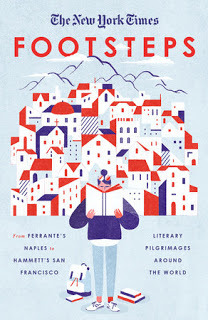 Footsteps
Literary pilgrimages around the world from the pages of The New York Times
Footsteps
Literary pilgrimages around the world from the pages of The New York Times
A writer’s inspiration can come from many things; a person, object, or even a particular location. A special place can sink into your bones, color your thoughts, ooze from your pen (or computer.) Some places are so closely associated with a writer as to be inseparable. Say “Charles Dickens” and you immediately think of Victorian England. How would stories have changed if L. M. Montgomery never lived on Prince Edward Island or if Stephen King settled in Arizona instead of Maine?
Footsteps is a collection of articles from an ongoing series in The New York Times that explores how the physical path a writer takes affects the literary journey. Each one is written by a different person who thoughtfully walks in the footsteps of a favorite author. The result is a collection of delightfully different travel essays. The selected authors are an eclectic mix spread across the globe. Some, such as Mark Twain, are well known, but others such as novelist Orhan Pamuk of Istanbul might be new to the reader. All the essays are charming and written with obvious affection and even a bit of whimsy. In a walking tour to trace fictional Sam Spade’s routes through the real Dashiell Hammett’s San Francisco, the essay’s author came across the following tongue-in-cheek plaque on Burritt Street. “On approximately this spot, Miles Archer, Sam Spade’s partner, was done in by Brigid O’Shaughnessy.” There is no mention of the Maltese Falcon or that Sam, Miles, and Brigid never existed.
Many of the essays hold a surprise or two. Bram Stoker’s inspiration for Dracula’s eerie setting came from the English coastal resort of Whitby and not Transylvania. H. P. Lovecraft was an early king of creepy and he found his doorway to hell in Providence, Rhode Island. Sometimes the negative affect of a place was more profound than the positive. Alice Munro hated Vancouver, British Columbia, but used her time there to craft memorable stories. Some essays have a dash of bittersweet. Not every writer ended up rich and successful. Many weren’t particularly admirable (Shelley and Bryon were two misogynistic dirtbags), but all had been touched by a place that transformed their writing into glorious words.
I highly recommend Footsteps as both a quirky travel guide and a warm-hearted tribute to writers and their inspiration. I received this book from Blogging for Books in exchange for a review.
Published on June 02, 2017 02:00
May 27, 2017
The Ins and Outs of Ghostwriting Written With No Help From Anyone (or maybe not)
(Scroll to the bottom for a free ebook offer of my new release)
Ask any real author. Writing a book is hard work, but the mob isn’t the only business with hired guns. They abound in publishing and are called ghostwriters. Ghostwriters work for cash up front. In exchange for a hefty paycheck, a ghostwriter often gets no credit and may even have to sign a non-disclosure agreement, in effect, denying any input into the project.
 Why be a Ghostwriter?
What causes a talented writer to not only cheerfully agree to publicly deny their accomplishments but also willingly assign them to someone who can’t string three sentences together to form a coherent paragraph? The answer is stability and money. Ghostwriting used to be publishing’s dirty little secret, but now is considered a subgenre and good ghostwriters are in high demand. Once a ghostwriter gains a reputation for professionalism, sticking to a schedule, and keeping his or her mouth shut, publishers will even seek her out instead of the other way around.
Why be a Ghostwriter?
What causes a talented writer to not only cheerfully agree to publicly deny their accomplishments but also willingly assign them to someone who can’t string three sentences together to form a coherent paragraph? The answer is stability and money. Ghostwriting used to be publishing’s dirty little secret, but now is considered a subgenre and good ghostwriters are in high demand. Once a ghostwriter gains a reputation for professionalism, sticking to a schedule, and keeping his or her mouth shut, publishers will even seek her out instead of the other way around.
How Much Do Ghostwriters Make?
Ghostwriting can offer a nice income. North of the border, the Canadian Writers Union sets the minimum fee for ghostwriting a book at $25,000. In the US tracking down ghostwriting payments is murkier as each writer sets his or her own. Fees vary wildly, by genre, length and whether the project is for a celebrity. According to Writers Weekly, an experienced writer with a verifiable track record can earn $10,000 to $15,000 for a small project and prices go up from there. Ghostwriting has four general methods of payment; hourly, per page, per word, and per project. Shorter items are generally paid hourly, per page, or per word. Average hourly fees range from $70-$250. A per page fee might run $25 to $50, while per word might go from $0.25 to $3.
The biggest payoffs are for full-length books. Ghostwriters often bid on projects and again prices vary according to genre, page length and the amount of research needed. The low end is roughly $15,000 while the high end might be $l50,000. A celebrity autobiography can command much more and a well-known ghostwriter may even earn a percentage of royalties.
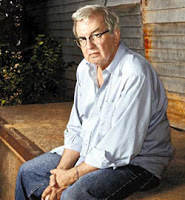 Larry McMurtry after his sex change
Larry McMurtry after his sex change
from Ophelia Ray Famous Ghostwriters Even writers with prolific careers used ghostwriters. The Player on the Other Side by Ellery Queen was ghostwritten by Theodore Sturgeon. James Patterson, what a man. Why, he comes out with a book a month. Oh, really? Have you taken a close look at one of his covers? His name is splashed in large manly writer’s font at the top in a place sure to grab your eyes, but who is that name in teeny tiny print at the bottom. Here’s a hint. It’s not his dry cleaner.
Peruse a list of well-known authors who were also ghostwriters and you’ll find a few surprises. H. P. Lovecraft was a prolific ghostwriter who created stories for Harry Houdini. Early in his career, Mozart ghostwrote music for other composers. A strong suspicion exists President Ulysses S. Grant’s autobiography was done by longtime friend, Mark Twain.
Other Famous Ghostwriters Tennis as I Play it by Maurice McLoughlin (Sinclair Lewis)Daughter of the Tejas by Ophelia Ray (Larry McMurtry)My Chinese Marriage by Mae T. Franking (Katherine Anne Porter)
What’s the Benefit of a Ghostwriter to a Publisher? Writing is a skill. Few famous people can put pen to paper with any degree of competency, but ego’s rule. Promising someone they can be known henceforth as a New York Times bestselling author holds definite appeal. It’s easy to lure someone to a big publishing contract when no actual work is involved other than signing their name on the dotted line and cashing the check.
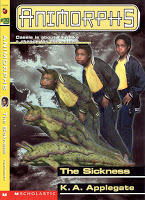 Publishers often want to continue or expand a popular series. Both the Hardy Boys and Nancy Drew books were ghostwritten. Demand for the Goosebumps series was so high author R. L. Stine couldn’t maintain output, so the publisher used ghostwriters to produce a book a month. The Sweet Valley High series has Francine Pascal on the covers, but in fact she was the series’ creator. Pascal put together a reference manual for ghostwriters to craft stories while her role remained editorial. Without writing a word, she sold over 150 million copies worldwide. Books #25 to #52 in the Animorph series by K. A. Applegate were written by one of 12 different ghostwriters picked from Applegate’s former editors and writing students.
Publishers often want to continue or expand a popular series. Both the Hardy Boys and Nancy Drew books were ghostwritten. Demand for the Goosebumps series was so high author R. L. Stine couldn’t maintain output, so the publisher used ghostwriters to produce a book a month. The Sweet Valley High series has Francine Pascal on the covers, but in fact she was the series’ creator. Pascal put together a reference manual for ghostwriters to craft stories while her role remained editorial. Without writing a word, she sold over 150 million copies worldwide. Books #25 to #52 in the Animorph series by K. A. Applegate were written by one of 12 different ghostwriters picked from Applegate’s former editors and writing students.
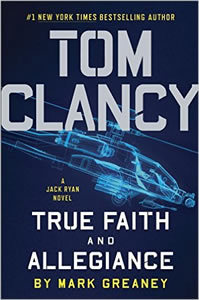 Book written by dead guyTom Clancy, V.C. Andrews, Mickey Spillane, and Ian Fleming recently had their names on new releases, which is pretty good considering they’ve all been dead for years. As a nod to the increased legitimacy of ghostwriting, the actual authors of the books now share credit and have a place of honor on the cover, too.
Book written by dead guyTom Clancy, V.C. Andrews, Mickey Spillane, and Ian Fleming recently had their names on new releases, which is pretty good considering they’ve all been dead for years. As a nod to the increased legitimacy of ghostwriting, the actual authors of the books now share credit and have a place of honor on the cover, too.
Famous Ghostwritten Books That Were on the New York Times Bestseller Lists (with ghostwriter in parentheses)Donald Trump in The Art of the Deal (Tony Schwartz)Sam Walton in Made in America (John Huey)Stephen Covey in The 7 Habits of Highly Effective People (Ken Shelton)Sarah Palin in Going Rogue (Lynn Vincent)JFK’s Profiles in Courage (Ted Sorensen)
What do you Need to be a Ghostwriter? No ego. You get little or no credit for your hard work.Solid writing credentials as a freelancer helps.Strong work ethic and people skills. You’ll often be on a deadline and have to deal with input from the ‘author.’
Want to give it a try? Check out Guru and Reedsy for job postings.
Would you like a free ebook? Consider this a pretty please begging request on bended knee for Amazon reviews for my new release. Read the blurb below. If you think Good Bones would be to your liking send me an email at l.a.kelley.author@gmail.com
Tell me whether you need epub, mobi, or PDF
Read and (I hope) love the book
Post a few kind words on Amazon
BOOM. You're done. Bless you.
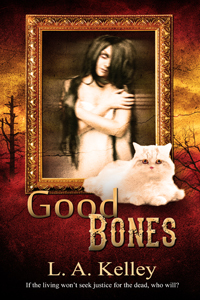 Good Bones
Good Bones
Good Bones
Good Bones
No matter how challenging the case, psychologist Katherine Fleming never shirks from helping a patient confront a painful issue. Her keen powers of observation and compassionate nature have eased many troubled souls, but a homicide detective with a buried secret of his own stirs more than just clinical interest.
The first time Detective Jake Sumner spied the old house, he sensed the good bones. Little did he know the purchase of the property included an unusual tenant far from resting in peace. Can the new psychologist in town help him treat a ghostly trauma case or is his growing attraction to Katherine Fleming best left buried?
With the aid of a mysterious white cat and a mystical mirror, Katherine and Jake join forces to solve a murder. Can they stop a killer from claiming the next victim or will their investigation only lead them six feet under?
Ask any real author. Writing a book is hard work, but the mob isn’t the only business with hired guns. They abound in publishing and are called ghostwriters. Ghostwriters work for cash up front. In exchange for a hefty paycheck, a ghostwriter often gets no credit and may even have to sign a non-disclosure agreement, in effect, denying any input into the project.
 Why be a Ghostwriter?
What causes a talented writer to not only cheerfully agree to publicly deny their accomplishments but also willingly assign them to someone who can’t string three sentences together to form a coherent paragraph? The answer is stability and money. Ghostwriting used to be publishing’s dirty little secret, but now is considered a subgenre and good ghostwriters are in high demand. Once a ghostwriter gains a reputation for professionalism, sticking to a schedule, and keeping his or her mouth shut, publishers will even seek her out instead of the other way around.
Why be a Ghostwriter?
What causes a talented writer to not only cheerfully agree to publicly deny their accomplishments but also willingly assign them to someone who can’t string three sentences together to form a coherent paragraph? The answer is stability and money. Ghostwriting used to be publishing’s dirty little secret, but now is considered a subgenre and good ghostwriters are in high demand. Once a ghostwriter gains a reputation for professionalism, sticking to a schedule, and keeping his or her mouth shut, publishers will even seek her out instead of the other way around.How Much Do Ghostwriters Make?

Ghostwriting can offer a nice income. North of the border, the Canadian Writers Union sets the minimum fee for ghostwriting a book at $25,000. In the US tracking down ghostwriting payments is murkier as each writer sets his or her own. Fees vary wildly, by genre, length and whether the project is for a celebrity. According to Writers Weekly, an experienced writer with a verifiable track record can earn $10,000 to $15,000 for a small project and prices go up from there. Ghostwriting has four general methods of payment; hourly, per page, per word, and per project. Shorter items are generally paid hourly, per page, or per word. Average hourly fees range from $70-$250. A per page fee might run $25 to $50, while per word might go from $0.25 to $3.
The biggest payoffs are for full-length books. Ghostwriters often bid on projects and again prices vary according to genre, page length and the amount of research needed. The low end is roughly $15,000 while the high end might be $l50,000. A celebrity autobiography can command much more and a well-known ghostwriter may even earn a percentage of royalties.
 Larry McMurtry after his sex change
Larry McMurtry after his sex changefrom Ophelia Ray Famous Ghostwriters Even writers with prolific careers used ghostwriters. The Player on the Other Side by Ellery Queen was ghostwritten by Theodore Sturgeon. James Patterson, what a man. Why, he comes out with a book a month. Oh, really? Have you taken a close look at one of his covers? His name is splashed in large manly writer’s font at the top in a place sure to grab your eyes, but who is that name in teeny tiny print at the bottom. Here’s a hint. It’s not his dry cleaner.
Peruse a list of well-known authors who were also ghostwriters and you’ll find a few surprises. H. P. Lovecraft was a prolific ghostwriter who created stories for Harry Houdini. Early in his career, Mozart ghostwrote music for other composers. A strong suspicion exists President Ulysses S. Grant’s autobiography was done by longtime friend, Mark Twain.
Other Famous Ghostwriters Tennis as I Play it by Maurice McLoughlin (Sinclair Lewis)Daughter of the Tejas by Ophelia Ray (Larry McMurtry)My Chinese Marriage by Mae T. Franking (Katherine Anne Porter)
What’s the Benefit of a Ghostwriter to a Publisher? Writing is a skill. Few famous people can put pen to paper with any degree of competency, but ego’s rule. Promising someone they can be known henceforth as a New York Times bestselling author holds definite appeal. It’s easy to lure someone to a big publishing contract when no actual work is involved other than signing their name on the dotted line and cashing the check.
 Publishers often want to continue or expand a popular series. Both the Hardy Boys and Nancy Drew books were ghostwritten. Demand for the Goosebumps series was so high author R. L. Stine couldn’t maintain output, so the publisher used ghostwriters to produce a book a month. The Sweet Valley High series has Francine Pascal on the covers, but in fact she was the series’ creator. Pascal put together a reference manual for ghostwriters to craft stories while her role remained editorial. Without writing a word, she sold over 150 million copies worldwide. Books #25 to #52 in the Animorph series by K. A. Applegate were written by one of 12 different ghostwriters picked from Applegate’s former editors and writing students.
Publishers often want to continue or expand a popular series. Both the Hardy Boys and Nancy Drew books were ghostwritten. Demand for the Goosebumps series was so high author R. L. Stine couldn’t maintain output, so the publisher used ghostwriters to produce a book a month. The Sweet Valley High series has Francine Pascal on the covers, but in fact she was the series’ creator. Pascal put together a reference manual for ghostwriters to craft stories while her role remained editorial. Without writing a word, she sold over 150 million copies worldwide. Books #25 to #52 in the Animorph series by K. A. Applegate were written by one of 12 different ghostwriters picked from Applegate’s former editors and writing students. Book written by dead guyTom Clancy, V.C. Andrews, Mickey Spillane, and Ian Fleming recently had their names on new releases, which is pretty good considering they’ve all been dead for years. As a nod to the increased legitimacy of ghostwriting, the actual authors of the books now share credit and have a place of honor on the cover, too.
Book written by dead guyTom Clancy, V.C. Andrews, Mickey Spillane, and Ian Fleming recently had their names on new releases, which is pretty good considering they’ve all been dead for years. As a nod to the increased legitimacy of ghostwriting, the actual authors of the books now share credit and have a place of honor on the cover, too.Famous Ghostwritten Books That Were on the New York Times Bestseller Lists (with ghostwriter in parentheses)Donald Trump in The Art of the Deal (Tony Schwartz)Sam Walton in Made in America (John Huey)Stephen Covey in The 7 Habits of Highly Effective People (Ken Shelton)Sarah Palin in Going Rogue (Lynn Vincent)JFK’s Profiles in Courage (Ted Sorensen)
What do you Need to be a Ghostwriter? No ego. You get little or no credit for your hard work.Solid writing credentials as a freelancer helps.Strong work ethic and people skills. You’ll often be on a deadline and have to deal with input from the ‘author.’
Want to give it a try? Check out Guru and Reedsy for job postings.
Would you like a free ebook? Consider this a pretty please begging request on bended knee for Amazon reviews for my new release. Read the blurb below. If you think Good Bones would be to your liking send me an email at l.a.kelley.author@gmail.com
Tell me whether you need epub, mobi, or PDF
Read and (I hope) love the book
Post a few kind words on Amazon
BOOM. You're done. Bless you.
 Good Bones
Good Bones
Good Bones
Good Bones
No matter how challenging the case, psychologist Katherine Fleming never shirks from helping a patient confront a painful issue. Her keen powers of observation and compassionate nature have eased many troubled souls, but a homicide detective with a buried secret of his own stirs more than just clinical interest.
The first time Detective Jake Sumner spied the old house, he sensed the good bones. Little did he know the purchase of the property included an unusual tenant far from resting in peace. Can the new psychologist in town help him treat a ghostly trauma case or is his growing attraction to Katherine Fleming best left buried?
With the aid of a mysterious white cat and a mystical mirror, Katherine and Jake join forces to solve a murder. Can they stop a killer from claiming the next victim or will their investigation only lead them six feet under?
Published on May 27, 2017 01:00
May 22, 2017
Book Spotlight: A Hundred Kisses by Jean M. Grant
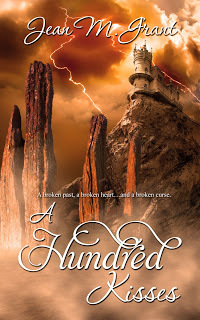 1296
1296
Two wedding nights. Two dead husbands.
Deirdre MacCoinneach wishes to understand her unusual ability to sense others’ lifeblood energies…and vows to discover if her gift killed the men she married. Her father’s search for a new and unsuspecting suitor for Deirdre becomes complicated when rumors of witchcraft abound.
Under the façade of a trader, Alasdair Montgomerie travels to Uist with pivotal information for a Claimant seeking the Scottish throne. A ruthless baron hunts him and a dark past haunts him, leaving little room for alliances with a Highland laird or his tempting daughter.Awestruck when she realizes that her unlikely travel companion is the man from her visions, a man whose thickly veiled emotions are buried beneath his burning lifeblood, Deirdre wonders if he, too, will die in her bed if she follows her father’s orders. Amidst magic, superstition, and ghosts of the past, Alasdair and Deirdre find themselves falling together in a web of secrets and the curse of a hundred kisses…
ExcerptShe sensed no colors in the murky, lifeless water, and it was freeing. All breath escaped her. Muted visions passed before her eyes—her mother, her father, Gordon, and Cortland. Just a moment longer, she thought…Suddenly, a burst of warm light invaded her thoughts as air filled her lungs. Red-hot hands burned her shoulders and ripped her from her icy grave. She breathed life into her body. She coughed, gagging on the change.Muffled words yelled at her.Oh, God, so hot. His fingers were like hot pokers. Her head pounded as she slowly returned to the present. Heat radiated from her rescuer. Somebody had pulled her from the water.“Wh—?”“Hush, lass. You nearly drowned.”His voice was as soothing as a warm cup of goat’s milk on a winter’s day. A red-hot glow emanated from his body. Never before had she felt such a strong lifeblood, and it nearly burned her. She struggled in his arms to get free. She blinked, only seeing a blurry form before her. “Release me!”She splashed and wriggled, and he did as told. She clambered to the shoreline. Numb and shaken, she began to dress. It wasn’t easy as she fumbled with slick fingers to put dry clothes over wet skin. She instantly regretted her naked swim. She pulled on her long-sleeved white chemise first.She faced the forest, away from her rescuer. He quietly splashed to shore. His lifeblood burned into her back. He wasn’t far behind, but he stopped. She refused to look at him until she was fully clothed, not out of embarrassment of her nudity, but for what had just happened. He released a groan and mumbled under his breath about wet boots. His voice was not one of her father’s soldiers.When she put the last garment on, her brown wool work kirtle, she squeezed out her sopping hair and swept her hands through the knotty mess. She fastened her belt and tied the lacings up the front of the kirtle. Blood returned to her fingertips, and she regained her composure. Belated awareness struck her, and she leaned down and searched through her bag for her dagger. She spun around.She gasped as she saw the man sitting on the stone-covered shoreline, his wet boots off. Confusion and the hint of a scowl filled his strong-featured face. She staggered back, caught her heel on a stone, and fell, dropping the dagger. Dirt and pebbles stuck to her wet hands and feet, and she instinctively scrambled away from him.His glower, iridescent dark blue eyes, and disheveled black hair were not unfamiliar. Staring at her was the man she had seen in her dream—it was the man from the wood.
 Author Bio:Jean is a scientist, part-time education director, and a mom. She currently resides in Massachusetts and draws from her interests in history, science, the outdoors, and her family for inspiration. She enjoys writing non-fiction articles for family-oriented and travel magazines, and aspires to write children’s books while continuing to write novels. In 2008, she visited the land of her daydreams, Scotland, and it was nothing short of breathtaking. Jean enjoys tending to her flower gardens, tackling the biggest mountains in New England with her husband, and playing with her sons, while daydreaming about the next hero to write about...
Author Bio:Jean is a scientist, part-time education director, and a mom. She currently resides in Massachusetts and draws from her interests in history, science, the outdoors, and her family for inspiration. She enjoys writing non-fiction articles for family-oriented and travel magazines, and aspires to write children’s books while continuing to write novels. In 2008, she visited the land of her daydreams, Scotland, and it was nothing short of breathtaking. Jean enjoys tending to her flower gardens, tackling the biggest mountains in New England with her husband, and playing with her sons, while daydreaming about the next hero to write about...Connect with JeanWEBSITEFACEBOOKTWITTER
Buy Links:AmazonWild Rose Press ebookWild Rose Press paperback
Published on May 22, 2017 00:30
April 27, 2017
So Many, Many, Many, Ways to Die (during National Poetry Month)
April is National Poetry Month. In honor of the occasion is my contribution below. (Note this is National Poetry Month, not National Good Poetry Month.)
So Many, Many, Many Ways to Die by L. A. Kelley
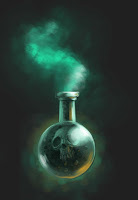 Will I drown you in the tub?Beat your brains out with a club?Swap your packs of Sweet’N Low for cyanide?Once you’re sound asleep in bedVoila! A bullet through the head.So many, many, many ways to die.
Will I drown you in the tub?Beat your brains out with a club?Swap your packs of Sweet’N Low for cyanide?Once you’re sound asleep in bedVoila! A bullet through the head.So many, many, many ways to die.
If I laced your diet cola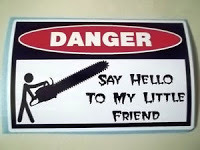 With a tincture of ebolaYou’d hardly have the time to wave goodbye.A well-delivered sliceWith a chain saw should suffice.So many, many, many ways to die.
With a tincture of ebolaYou’d hardly have the time to wave goodbye.A well-delivered sliceWith a chain saw should suffice.So many, many, many ways to die.
You wouldn't have a fun dayIf you’re flattened by my Hyundai.Crushed organs leave a person less than spry.A Hefty bag’s facilitationSimplifies asphyxiation.So many, many, many ways to die.
 C4’s pronounced kaboomWould precipitate your doom.You’d be teensy bits before I blink an eye.One quick shove into the freezer?A deveining with a tweezer?So many, many, many ways to die
C4’s pronounced kaboomWould precipitate your doom.You’d be teensy bits before I blink an eye.One quick shove into the freezer?A deveining with a tweezer?So many, many, many ways to die
Since I caught you in the act With your mistress in the sackYour cheating heart I can no more deny.For me, the best solutionIs a simple execution.So many, many, many, ways to die.
With your mistress in the sackYour cheating heart I can no more deny.For me, the best solutionIs a simple execution.So many, many, many, ways to die.
I won’t ruin the surprise With the date of your demiseJust know I have the perfect alibi.So when next we meet, my dear,You’ll be on the funeral bierFor I’ve decided on the way for you to die.
With the date of your demiseJust know I have the perfect alibi.So when next we meet, my dear,You’ll be on the funeral bierFor I’ve decided on the way for you to die.
So Many, Many, Many Ways to Die by L. A. Kelley
 Will I drown you in the tub?Beat your brains out with a club?Swap your packs of Sweet’N Low for cyanide?Once you’re sound asleep in bedVoila! A bullet through the head.So many, many, many ways to die.
Will I drown you in the tub?Beat your brains out with a club?Swap your packs of Sweet’N Low for cyanide?Once you’re sound asleep in bedVoila! A bullet through the head.So many, many, many ways to die.If I laced your diet cola
 With a tincture of ebolaYou’d hardly have the time to wave goodbye.A well-delivered sliceWith a chain saw should suffice.So many, many, many ways to die.
With a tincture of ebolaYou’d hardly have the time to wave goodbye.A well-delivered sliceWith a chain saw should suffice.So many, many, many ways to die.You wouldn't have a fun dayIf you’re flattened by my Hyundai.Crushed organs leave a person less than spry.A Hefty bag’s facilitationSimplifies asphyxiation.So many, many, many ways to die.
 C4’s pronounced kaboomWould precipitate your doom.You’d be teensy bits before I blink an eye.One quick shove into the freezer?A deveining with a tweezer?So many, many, many ways to die
C4’s pronounced kaboomWould precipitate your doom.You’d be teensy bits before I blink an eye.One quick shove into the freezer?A deveining with a tweezer?So many, many, many ways to dieSince I caught you in the act
 With your mistress in the sackYour cheating heart I can no more deny.For me, the best solutionIs a simple execution.So many, many, many, ways to die.
With your mistress in the sackYour cheating heart I can no more deny.For me, the best solutionIs a simple execution.So many, many, many, ways to die.
I won’t ruin the surprise
 With the date of your demiseJust know I have the perfect alibi.So when next we meet, my dear,You’ll be on the funeral bierFor I’ve decided on the way for you to die.
With the date of your demiseJust know I have the perfect alibi.So when next we meet, my dear,You’ll be on the funeral bierFor I’ve decided on the way for you to die.
Published on April 27, 2017 03:00
April 16, 2017
Easter Haiku to Honor Peeps
In honor of National Poetry Month, here's a Easter haiku. What is haiku? It's a three stanza poem of 5 syllables, 7 syllables, and 5 syllables.
Peeps Haiku
 Jump in little Peep!Hot tub fun waiting for you.
Jump in little Peep!Hot tub fun waiting for you.
 Sad eyes see the truth.
Sad eyes see the truth.
Peeps Haiku
 Jump in little Peep!Hot tub fun waiting for you.
Jump in little Peep!Hot tub fun waiting for you.
 Sad eyes see the truth.
Sad eyes see the truth.
Published on April 16, 2017 03:00
April 3, 2017
Book Review: The Moth Presents All These Wonders: True Stories About Facing the Unknown
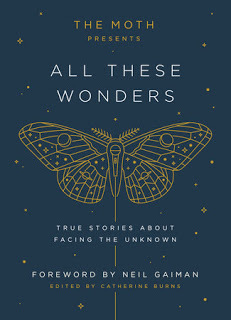 There’s something so down-to-earth entertaining about shared stories. Back in the 1990s a man named George Dawes Green and his friends sponsored storytelling events, sharing life experience on stage throughout the New York area. The group had no set venue and fluttered from place to place, so the event was referred to as The Moth. It since evolved into a radio/blog show. Performances of the storytellers along with tips for your own storytelling are now available on The Moth website
There’s something so down-to-earth entertaining about shared stories. Back in the 1990s a man named George Dawes Green and his friends sponsored storytelling events, sharing life experience on stage throughout the New York area. The group had no set venue and fluttered from place to place, so the event was referred to as The Moth. It since evolved into a radio/blog show. Performances of the storytellers along with tips for your own storytelling are now available on The Moth websiteThe logo of The Moth is True stories told live. The mission is to promote the art and craft of storytelling and to honor and celebrate the diversity and commonality of human experience. We’re not all that different and the founders of the The Moth believe the best connections are forged when people tell true stories about what transpired in a person’s life to define an individual, shake up a life, or change a view.
All These Wonders is a compilation of these stories. They are short and easy to read, with nearly fifty in the book. A life changing experience doesn’t take a lot of time to explain in the hands of a good storyteller. The authors range in age from teenagers to senior citizen. A lot of the stories have a bit of wistfulness, even when the people become better for their experiences in the end. After all, life is hard and full of bumps in the road, and many of the stories reflect that. The topics are eclectic; from David Bowie’s hairdresser to a Jewish Orthodox boy’s illicit taste of nonkosher pizza. Some stories are better than others and a few are downright whiny in the oh-poor-me category. My favorite is from Cathy Olkin, a planetary scientist, about a mission to Pluto. Although, I didn’t find all the stories inspiring, they were at least interesting.
If you rather hear instead of read stories, check out The Moth website at https://www.themoth.org/
I received this book from Blogging for Book in exchange for a review.
Published on April 03, 2017 16:54



